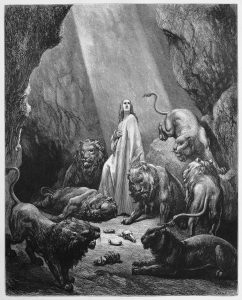
(Scroll down to leave a comment on how you are resistant to the customs of this world.)
Daniel 1:1–8
Daniel was keenly aware of the temptation to yield to the pressures of the culture around him. After all, he was a long way from home, and who would really know if he, for instance, changed his diet? Yet he chose to resist the pressures and not to give in to them. He drew the line. Note, however, that he went along with some things, nonessentials like learning the language or reading Babylon’s history. But Daniel resisted at each and every point he was called upon to do something that was diametrically opposed to his convictions regarding God’s commands. Daniel made some really tough decisions when many around him found it easier to go along and give in. To fully understand the significance of what is happening, we need to ask ourselves some questions: where, who, when, what and why.
Where does all of this take place?
Daniel’s story begins at home in Judah. After the reign of King Solomon, the twelve tribes of Israel divided into ten tribes in the north and two in the south. The northern kingdom never had one good king and met its end in 722 B.C. when they were taken away into Assyrian captivity. In the south, nineteen kings ruled from its capital in Jerusalem over three and a half centuries. While many of the kings strayed from their biblical convictions, several of them were good kings. It was here in the southern kingdom of Judah that Daniel was born, and we meet him when he was a teenager. The other place mentioned is Babylon, located in modern-day Iraq. In Daniel’s day, Babylon had become the antithesis to everything Bible believers hold dear. It was the heart of paganism and the undisputed world power of its day.
Who is involved?
 A better understanding comes with a knowledge of who was on center stage in Daniel’s story. There was Nebuchadnezzar, the king of Babylon. He was an electrifying leader who built an incredible city and developed a world empire. Next, we meet Jehoiakim, king of Judah, on his throne in Jerusalem. Sadly, he was nothing more than a spineless puppet. He led the Jews to worship other gods and “did evil in the sight of the Lord” (2 Kings 24:19). The Bible places the blame squarely on him for filling Jerusalem “with innocent blood” (v. 4).
A better understanding comes with a knowledge of who was on center stage in Daniel’s story. There was Nebuchadnezzar, the king of Babylon. He was an electrifying leader who built an incredible city and developed a world empire. Next, we meet Jehoiakim, king of Judah, on his throne in Jerusalem. Sadly, he was nothing more than a spineless puppet. He led the Jews to worship other gods and “did evil in the sight of the Lord” (2 Kings 24:19). The Bible places the blame squarely on him for filling Jerusalem “with innocent blood” (v. 4).
We are also introduced to a young man named Daniel, who was a descendant of good King Hezekiah. As a boy, he was caught up in the spiritual revival under King Josiah, an experience that profoundly impacted his young life. Extremely bright and handsome, if he lived in our modern world, he would no doubt be elected as “Most Likely to Succeed” at any school he attended. But his world, with all its promise, was turned upside down when the Babylonians conquered Jerusalem and took him captive back to Babylon.
When did all of this take place?
Daniel 1:1 reveals that these events ensued during the “third year of the reign of Jehoiakim.” That would date this episode in 605 B.C. By God’s design, these were days of severe punishment and persecution of God’s straying people. Nebuchadnezzar rounded up a small group of Judah’s brightest and most promising young people and carried them back to Babylon. When the destruction of Jerusalem became complete in 587 B.C., Daniel had already been in exile throughout his teen years and into his early adulthood.
What was actually taking place?
It was nothing short of the judgment of God Himself. The Bible frames it by saying, “The Lord gave Jehoiakim king of Judah into [Nebuchadnezzar’s] hand” (Daniel 1:2). God was in control, and the lesson is… He still is in control. He is holding the remote. He is pushing the buttons. In a real sense, this wicked king of Babylon was nothing more than the remote control in the hand of God. Jeremiah even quoted the Lord as calling Nebuchadnezzar “My servant” (Jeremiah 25:9).
Not a lot of people in our modern world seem to believe that God still judges sin and that He actually still holds in His hand the remote control over our lives and all history. For years, this coming Babylonian captivity had been predicted by God’s prophets in amazing detail (Isaiah 39:5–7; Jeremiah 25:8–12; 2 Kings 20:17–18). However, Judah would not repent. Warning after warning came their way, but they blindly believed that they were indestructible. Before we are too quick to point a finger of accusation their way, we should examine ourselves to see if we are not sailing the seas of uncertainty in the same boat.
Once the people of Judah were taken away into captivity, we only have to read Psalm 137:1–6 to catch a glimpse into their hearts:
By the rivers of Babylon,
There we sat down, yea, we wept
When we remembered Zion.
We hung our harps
Upon the willows in the midst of it.
For there those who carried us away captive asked of us a song,
And those who plundered us requested mirth,
Saying, “Sing us one of the songs of Zion!”
How shall we sing the Lord’s song
In a foreign land?
If I forget you, O Jerusalem,
Let my right hand forget its skill!
If I do not remember you,
Let my tongue cling to the roof of my mouth—
If I do not exalt Jerusalem
Above my chief joy.
Yes, it was the Lord who gave the Jews into Babylonian captivity.
And why did God allow this? After all, He once called Israel the “apple of His eye” (Zechariah 2:8), but the Bible says, “Whom the Lord loves He chastens” (Hebrews 12:6). The captivity was not designed so much to scourge His people as to purge them. Many good things resulted in the aftermath. Israel never again followed after idols, and that remains true to this very day. The Hebrew Bible began to come together under men like Ezra. The remnant of God’s people eventually returned to Jerusalem, and in it was the seed of our Messiah. This captivity carried God’s message of hope and love to heathen lands. A few centuries later, when the Magi came from this same region to Bethlehem to worship the Christ child, it was because their forefathers had heard of Him from Daniel and passed the account down through the generations. And all this happened because Daniel refused to give in; he stood resistant to the pressures around him. He stood for what he believed. We need many more like Daniel today.
Taken from The Daniel Code by O.S. Hawkins. Copyright © 2016 by Dr. O.S. Hawkins. Used by permission of Thomas Nelson.
- S. Hawkins has served pastorates, including the First Baptist Church in Fort Lauderdale, Florida, and the First Baptist Church in Dallas, Texas, for more than 25 years. A native of Fort Worth, Texas, he has a BBA from Texas Christian University and his MDiv and Ph.D. from Southwestern Baptist Theological Seminary. For almost a quarter of a century, he has served as president of GuideStone Financial Resources, with assets under management of $20 billion, serving 250,000 pastors, church staff members, missionaries, doctors, university professors, and other workers in various Christian organizations with their investment, retirement, and benefit service needs. He is the author of more than 40 books and regularly speaks to business groups and churches across the nation. All the author’s royalties and proceeds from the entire Code series go to support Mission:Dignity. You can learn more about Mission:Dignity by visiting MissionDignity.org. For more information on the Code series, visit www.OSHawkins.com/books
Read more articles by Dr. O.S. Hawkins at: https://www.goodnewsfl.org/author/o-s-hawkins/

Comments